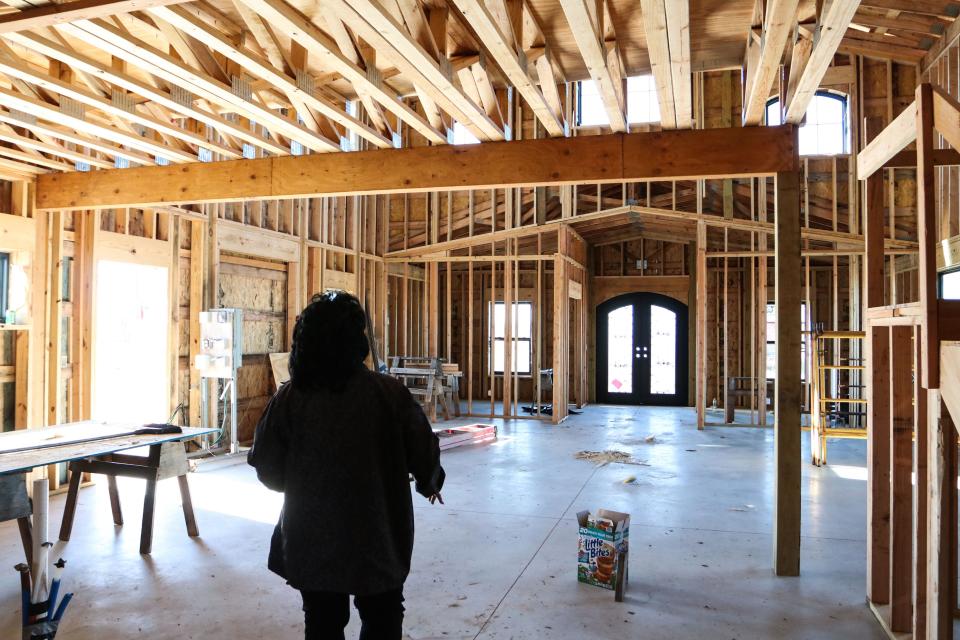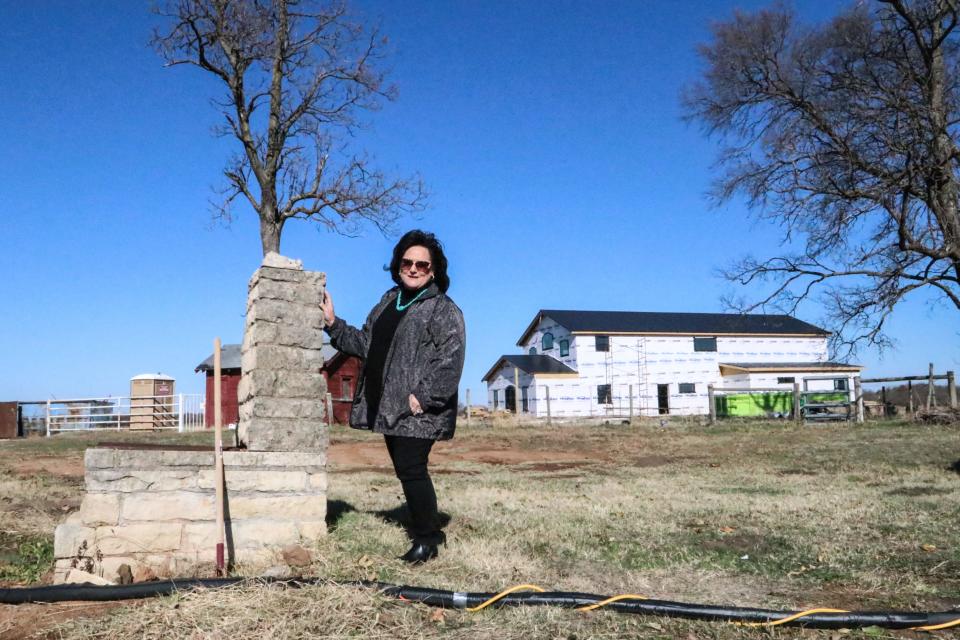Tribes need tax revenue. States keep taking it.
This story was originally published as a partnership between the Center for Public Integrity and ICT (formerly Indian Country Today). It is republished here by permission.
OSAGE NATION — On a crisp November morning, Teresa Bates Rutherford gazed at the construction site of her future home — her mind on her tax struggle with the state of Oklahoma.
The trust land she is building on has passed down through generations of her family on the Osage Reservation, located in northeastern Oklahoma. The state and county have limited jurisdiction on her land — a protection that should extend to taxes, but too often doesn’t.
Rutherford knows the tax laws better than most. She sits on the Osage Nation’s Tax Commission Board. Every month, she and two other Osage women pore over tax records for the tribe. Many of those records deal with the state, she says, which always wants more tax revenue.

For instance, Oklahoma makes vendors charge Rutherford state sales taxes on the materials for her home until she can provide them with proof that she qualifies for a tax exemption. There are no instructions available to apply for the exemption, she said, and she doesn’t know yet if the state will approve her request. She suspects most Osage citizens aren’t even aware they don’t have to pay these taxes.
“There’s always problems with taxation and the state,” said Rutherford, who has long dreamed of building this home for herself and her daughters. “The state just cannot accept us as a sovereign nation.”
An investigation by the Center for Public Integrity in partnership with ICT (formerly Indian Country Today) found that many state and local governments infringe on tribal nations’ taxing authority, siphoning billions of dollars in tax revenue from reservations over the past few decades alone.

It’s a modern version of wealth extraction, treating tribes as lesser entities whose sovereignty can be ignored. And it reduces the money tribal governments can spend on services in their communities, where poverty rates are often higher than in surrounding areas.
After enduring centuries of stolen land and seized resources, many tribes have been seeking economic recovery through commercial ventures. Tax policies are a major obstacle to further progress, tribal leaders say.
“Quite simply, we are asking for parity in the federal tax code and to be treated as other sovereigns in this country as reflected in the U.S. Constitution and numerous federal laws, treaties and federal court decisions,” said Mashantucket Pequot Chairman Rodney Butler during 2020 congressional testimony. “Without question, tax parity for tribal governments will allow for greater self-determination, economic growth and self-sufficiency for Indian Country.”
States are not allowed to tax economic interactions between tribal citizens and their governments. But courts have protected states’ ability to tax most economic interactions between tribal-run entities and non-tribal companies or individuals, precisely where most of the revenue opportunities lie.
Imagine if California made this demand of Nevada: When our residents visit, you have to charge our sales tax on their purchases and hand it over to us.
That’s effectively what states and counties do to tribal governments, and not only with sales taxes.
No national estimates exist for the total amount tribes have lost due to these tax policies. But court cases, reports and interviews with tribal leaders, attorneys and advocates compiled by the Center for Public Integrity and ICT show the scope is at least in the hundreds of millions of dollars each year. For instance:
Since 2008, North Dakota has collected more than $2.5 billion in tax revenue from the oil and gas industry on the Fort Berthold Reservation, according to Mandan, Hidatsa and Arikara Nation Chairman Mark Fox.
A recently settled lawsuit in Washington said the state was collecting more than $40 million annually in various taxes from a shopping center the Tulalip Tribes built to help generate revenue for the tribal government. The state and county collected another $20 million in taxes on the Tulalip Reservation in 2015 that was not disputed in the lawsuit.
In 2019, courts upheld Riverside County’s right to collect $23 million in annual tax revenue from non-tribal entities or people leasing trust lands from the Agua Caliente Band of Cahuilla Indians in California.
Montana collected more than $347 million from taxes on alcohol, tobacco and fuel sales and natural-resource development on reservations statewide in 2016. The state sent less than $11 million of that to tribal governments.
California and San Diego County collect more than $400,000 in property taxes every year from a wind-power project on the Campo Indian Reservation. The state also took $4 million in sales taxes when the turbines were installed.
When states and counties tax non-tribal businesses and customers on reservations, tribal governments face a thorny decision: Do they add their own taxes on top, which can drive economic activity away because it increases costs? Or do they forgo that, losing a source of critical revenue needed for government operations?
Many tribes have either not imposed their own taxes or reduced what they were charging, according to interviews with tribal leaders and records reviewed by Public Integrity and ICT. Some entered revenue-sharing agreements, often with the state or local government taking at least half of the tax revenue earned on tribal lands.
These outcomes largely keep tribal governments from using tax policy to attract business development in ways that cities, counties and states routinely tap.
And many tribal leaders say states, after collecting taxes from tribal economic activity, provide minimal services that benefit tribal citizens on reservations.
“It’s a real inhibitor of economic opportunity,” said Robert Odawi Porter, former president of the Seneca Nation and managing principal of the Capitol Hill Policy Group, a government relations firm that works with tribes. “The tribal government should have the same right to determine its tax policies as a state, local and federal government.”
The backdrop to this dynamic: Nearly all states tax in ways that take a greater share of income from people with less money and a lesser share from people with more. That increases economic inequality while reducing the revenue that states can collect, a Public Integrity investigation found.
Several states said they collaborate with tribal governments on taxation, though they gave little detail on the services they provide on reservations in exchange for the taxes they collect.
“New Mexico has made a concerted effort in recent years to work as cooperatively as possible on taxation issues with tribal governments in recognition of their sovereignty,” Charlie Moore, spokesman for the state’s Department of Taxation and Revenue, said by email.
Mike Nowatzki, a spokesman for North Dakota Gov. Doug Burgum, said by email that the administration works with tribes “to avoid a patchwork of taxation that might discourage economic development.”
Oklahoma officials did not respond to requests for comment.
In lawsuits about the matter, many states argue that they should be collecting tax revenue from economic activity on tribal lands because they provide services off-reservation — such as highways — that the customers and companies involved in on-reservation businesses need.
The U.S. Department of the Interior, the primary agency carrying out the United States’ obligation to protect tribal rights and assets, and to which tribes have turned to urge action on the taxation issue, declined to comment. Its reasoning: It didn’t “have anything to add on this.”
Tribal nations — and their lands — possess immunity from taxation by the U.S. and state governments. Hundreds of treaties state this. So does the U.S. Constitution, which put it this way: “Indians not taxed.”
The shift first began after the Indian Citizenship Act of 1924. Federal courts concluded that because Native people were now U.S. citizens, they had to pay federal income taxes.
There was no concurrent effort by the U.S. government to restore land and resource wealth stripped from most tribes after the continent was colonized.
“A lot of us feel strongly that we paid our taxes through the land that we ceded,” said Henry Cagey, councilmember and former chairman of the Lummi Nation. “Why do we as Indian people have to pay taxes to the United States when the land that we gave up is their tax base? The property taxes, the business taxes, all the income that they generate and run their government is based on the land we ceded.”
Thousands of tax protests
The biggest unresolved tax fight between a state and tribes is playing out in Oklahoma. The U.S. Supreme Court ruled in 2020 that the state must recognize several tribes in eastern Oklahoma and their reservation territory, which the state said were disestablished at its conception.
McGirt v. Oklahoma had to do with criminal jurisdiction, but the repercussions spilled into taxation for the Cherokee, Chickasaw, Choctaw, Muscogee and Seminole nations, whose reservations were reaffirmed by the ruling. The state has been collecting income taxes from tribal citizens who earned income on tribal lands involved in the McGirt case.
A 2020 report from the office of the executive director for the Oklahoma Tax Commission estimated that if these regions are considered Indian Country for taxing purposes, it could reduce state income tax collections by nearly $73 million per year and state sales and use tax collections by about $132 million annually.
Since the ruling, the state has faced thousands of administrative tax appeals and requests for exemptions, only some of which have moved to more formal hearings, The Oklahoman reported.
But in October, the Oklahoma Tax Commission ruled that it can keep collecting these taxes from citizens of the tribes in eastern Oklahoma despite McGirt. Commissioners said that the McGirt ruling did not expand to tax jurisdiction and noted that the 2020 report was published by a former executive director without their review or approval.
“This results in millions of dollars of overpayment by tribal citizens who are unlawfully subjected to Oklahoma income taxes,” Stacy Leeds, of the Cherokee Nation, who teaches federal Indian law at Arizona State University, wrote in her own protest to the state over her income taxes. “This over-taxation occurs, in large part, because Oklahoma knowingly misrepresents the law.”

The state tax commission and governor’s office did not answer questions about the impact of McGirt on taxes or Rutherford’s unrelated battle over sales taxes with the state, which is still ongoing.
In 1906, the U.S. government divided the Osage Reservation into 2,229 parcels of land, one for each Osage citizen. Rutherford is building her home on her family’s original allotment.
The land is in restricted status, the federal government holding it in trust to protect it for Rutherford. But she still has to prove that she can build on the land without the state intruding.
She submitted documents to the state to apply for an exemption for sales and use tax that would cover supplies for her new home. Now she is waiting to see whether she’ll be reimbursed for the taxes she already paid the state and exempted from taxes on future materials she’ll need as she moves forward with construction.
Since she is a restricted Osage landowner, she said, all the purchases she made for that new home should be free from state taxes.
“There are laws to back that up,” Rutherford said. “The state does have the right to tax in certain situations, but not this one. But as you know, Oklahoma doesn’t give that up very easily.”
Maya Srikrishnan is an investigative reporter with the Center for Public Integrity. Shannon Shaw Duty, Osage, is the editor of the Osage News. Joaqlin Estus, Tlingit, is a national correspondent for ICT.
This article originally appeared on Oklahoman: State, local governments tax activity on tribal lands, cutting tribes' take

